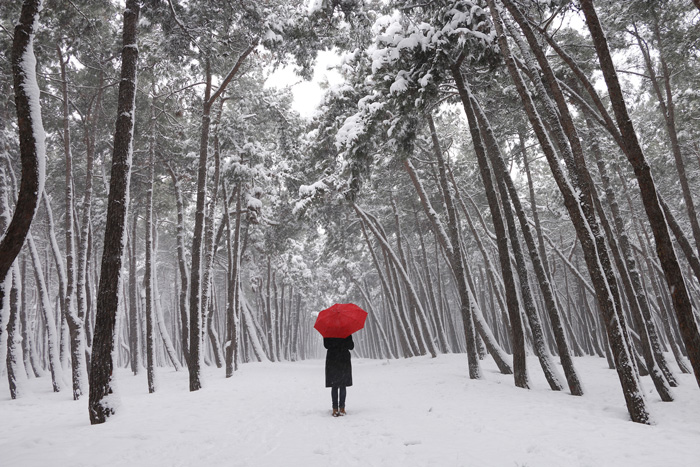
Red Umbrella
The girl with the red umbrella has haunted me for years now. When I met her, I was twenty-nine, and trying to put off thirty for as long as I could. Thirty is the age where people start asking if you’re ever going to settle down, if you’ll be able to bring grandkids into the family before it’s too late.
Riley had already been thirty when I left her. That was six months before the red umbrella girl, six months before Paris. It was supposed to be our honeymoon trip, but when I broke things off with Riley six months before our wedding, I decided to sell one plane ticket and use the other one on myself. I regretted the decision almost immediately. Paris had been Riley’s idea, after all, not mine.
I hadn’t known when I made reservations that May was the rainiest month in Paris. The whole time I was there, the downpours barely stopped. That was how I noticed the red umbrella girl – she was a splash of color among the grey.
She used to take walks up and down the street where my hotel was. I’d see her when I’d come outside to smoke. A few days went by before I got the urge to talk to her.
I think the initial reason was because she reminded me of Riley. It didn’t make sense to me at first. Riles was six feet tall, athletic, and black. She used to roll her eyes when I’d say African-American instead of black.
“You can call me black,” she’d say, “I don’t care if you say black.”
The red umbrella girl was, at first glance, the complete opposite of Riley: pale as a ghost, with a tiny frame almost like a small child’s.
Then I realized that the girl didn’t remind me of Riley as I’d known her for five years, but of Riley as I remembered her from that one night, the last time I saw her. The wide, frightened eyes, the way her posture folded in on itself, the pointless desperation with which she clung to the stem of that red umbrella; it was the same way my ex-fiancé had looked, utterly vulnerable for the first time, on the night I’d thrown it all away.
That was why I had to meet her.
There wasn’t any rain on the morning I decided to follow her. The sky was overcast, threatening to open up on us at any moment, but a drop had yet to fall. I was outside having my first cigarette of the day, and the familiar face passed in front of me. She was still holding that umbrella over her head like she did every day, even though it wasn’t raining. Leaving my usual smoking spot and going after her was a split-second decision.
She noticed me almost right away, I could tell, but she didn’t say anything. She led me to the nearest train station.
I’d made the wise decision to get a metro card, which on the first few days I’d used to go and see some of the sights. I’d given up on tourism after a while, but the card came in handy when I followed the girl to her platform and stood beside her – not too close, but close enough to talk to her once I figured out what to say.
A few seconds went by, during which we awkwardly glanced at each other and then away again. To my surprise, the red umbrella girl spoke first.
“You,” she said. “You…”
She had an accent of some kind, not French. Based solely on appearance I had to guess Chinese or Japanese. I wondered why she’d assumed I spoke English rather than French.
“You,” this time she pointed to me, and then made a walking motion with her index and middle fingers. Then she added, “Me,” and pointed to herself.
My guilty conscience understood right away. “I followed you.”
The red umbrella girl nodded vigorously.
“Uh…” I couldn’t deny it. “Yes. I followed you.”
Her stare bored into me. She squeezed the handle of the red umbrella, dragging the tip of it along the ground as she inched half a step away.
“I…I’m sorry, I don’t mean to scare you. I just see you a lot, and you’re always alone, so I thought you might want a friend.”
“No.”
“Oh. I see.”
I didn’t know what to do then, but her firm refusal of my friendship just reminded me more of Riley. Always stubborn, almost as stubborn as me. Always in denial about it all, about me, about us. That “no” – it was the same.
“Do you live here? Or are you just visiting?” I asked.
The red umbrella girl looked at me as if I’d grown two heads. I tried again.
“Do you live in Paris?”
“Yes.”
“Ah. I’m just here as a tourist. Maybe you could give me some tips, you know, show me where the locals hang out?”
The red umbrella girl said nothing. She stared straight ahead, very intensely, as if calling to the train with her mind.
“My name’s Charles, by the way.”
“Haruka,” she said very softly.
She finally looked at me again. Our eyes met.
“It means ‘spring’,” she added.
Our stare was broken by the distant rumble of the train speeding into the station. It stopped at our platform, and through the windows I could see people exiting on the other side. When our doors opened, I waited for Haruka to enter first, and I took a seat close to her. I left one seat in between us so I wouldn’t be invasive. She avoided looking at me completely; our momentary spring had somehow turned to winter.
There were only a few other people on the train, and it was very quiet save for the low hum of its motion. I wondered how Haruka had managed to find such a lonely train in such a large city. In my peripheral vision I saw her pull a water bottle out of a messenger bag I hadn’t noticed before. She twisted the cap, her small hands trembling with the effort, but to no avail.
“Let me try,” I offered, extending my hand.
Her wide eyes questioned me again, but she slowly reached across the buffer seat and placed the plastic bottle in my palm. It was a stubborn thing, but it only took me a few turns to unscrew the top. I handed it back to her, and she thanked me with the slightest nod of her head.
“It’s no problem,” I said.
Haruka took a tiny sip of her water. She carefully spun the cap back on and tested it by turning the bottle on its side. When she seemed sure that it wouldn’t leak, she placed it back into her bag.
“How long have you been living in Paris?” I asked.
“Three years,” Haruka said after a thoughtful pause.
“Wow. Maybe you should teach me some French, then. I’ve made a total ass of myself here so far. I was planning on Riley – my ex – being here with me to translate, ’cause she was always good at French, but uh…”
I trailed off, realizing that I’d begun rambling about Riley. I hadn’t meant to, and in fact I’d barely caught myself doing it. Haruka was just listening so intently, or at least she seemed to be, and so much time had passed without me explaining things, explaining my side of the story to someone. It turns out when you kick the best thing that ever happened to you to the curb, friends and family aren’t overly supportive. They told me I had to learn to commit to something for once. But they couldn’t understand without seeing it through my eyes.
“Well, I just got scared,” I admitted. It felt good to say it aloud. “I mean, how was I supposed to go through with it, making that screwed-up relationship a permanent thing? She thought she could fix me, you know? She wanted me to stop smoking, stop drinking, start going on runs with her and socialize with all her work friends that I hated. It was never gonna be enough – she deserved better. Eventually she would’ve figured that out, right? Better to go ahead and end it before it started.”
I watched Haruka for a reaction, but her face was very calm, giving away nothing. I wasn’t sure she’d fully understood what I’d said, but she seemed to have understood what I’d meant. She took while to reply, likely searching for the words.
“I think to be scared is…not bad. Not wrong,” she said.
“Right?” I agreed. “Thank you. Really, how could I not be afraid of marriage, given the fine fucking example my parents set for me growing up? Fighting, then the divorce, and what that did to my dad, well…”
“Your father…is dead?” Haruka asked cautiously.
I was at a momentary loss for words. Out of everything I’d just told her so candidly, somehow she’d only taken away the thing that I’d left most ambiguous. I almost laughed when I thought, now she reminds me of Riley because she sees right through me.
“Yes,” I said; my voice cracked.
We both gasped as the train rushed out from beneath the ground and sunlight burst through the window without warning. For a moment the city was a blur outside the glass, and then we were thrust back into nothingness. It was strange how the light had startled us so much more than the dark. Haruka composed herself first.
“My father is dead also. And my mother.”
I swallowed to coat my dry throat. “I’m very sorry,” I said.
Haruka shook her head. “They are dead when I am…very young. I do not know them.”
We slowed to a stop. The doors opened. I watched Haruka from the corner of my eye, but she didn’t make any move to get up. Our conversation paused as people shifted through the train car, some leaving and some arriving. A woman and her son sat down in the seats directly across from Haruka and I, where there hadn’t been anyone before. The small change made the train feel much less intimate.
The little boy couldn’t have been more than six or seven years old, and he was nibbling on a pastry. His mother had placed a napkin in his lap, which didn’t help the thin layer of sugar beginning to coat his face. When she tried to wipe his cheeks, he pulled away. I saw myself in that stubborn little boy.
“I don’t understand why you won’t let me help you,” Riley used to say.
She never understood why I didn’t want her help. I didn’t need her help. Her version of help was to make me into someone I wasn’t, someone more like her. I could quit smoking and drinking anytime I wanted if she’d just leave me alone about it. But I was never going to wake up at 5am to make protein shakes or bring homemade desserts to the office Christmas party.
“I love you the way you are. That’s why I’m doing this,” she’d argue.
But I know she never loved me. She loved who she thought she could make me into. The same way my mom was about my dad, right up until she drove him out our front door and into his grave. I wasn’t going to end up like that – I refused to.
As I lost myself in thought Haruka ignored me, staring straight ahead. Maybe I’d done something wrong by telling those dark details about my life. Maybe she was finished talking to me. At the next stop the boy and his mother left, and I watched to see if Haruka would do the same. She didn’t.
The seat directly across from us was empty again. In fact, the whole car was empty except for an old man who sat in the corner and occasionally coughed. I doubted he could hear us, and he certainly didn’t give a damn about us either way. I caught Haruka looking at him too. I wondered if she was thinking the same thing.
“My…my brother of my mother,” Haruka began, still staring at the old man.
“Your uncle?” I said.
Haruka nodded. “Yes. My uncle. He take me. I live together with him in Hokkaido when I am young.”
“I see. Now, Hokkaido, is that city or countryside?”
“Countryside,” Haruka said. She turned to face me, and then added, “His job. He have many cows. Take milk from cows. Sell milk. I help. I do not like it.”
“I see,” I repeated.
I wasn’t sure what else to say, but she’d listened to me about Riley, so I figured the least I could do was let her complain about dairy farming. She stopped talking after that, but she was still staring at me expectantly. Waiting, but for what?
“But…but you don’t do that anymore, obviously,” I offered.
Haruka nodded. She looked away. She was clenching the red umbrella, which sat in her lap, with both hands. There was something else there, something underneath the surface and in-between the lines that she was trying to tell me. I could feel it begging to be free. She started tapping her right foot.
“My uncle is dead also,” Haruka said.
“Oh. What happened?”
Haruka watched her hands, which continued to squeeze the umbrella, holding on for dear life. She shook her head slowly back and forth for a few seconds.
“Eating. Eating and,” she stopped and placed both hands at her throat. Her eyes met mine, looking for help.
“Choking? He choked?”
Haruka nodded very quickly. It made her hair look frizzy.
“I’m sorry to hear that.”
“No,” Haruka said. It was the same firm “no” she’d said before. She was shaking her head, gaze directed downward.
“I don’t understand,” I said.
She looked right at me. Her body was still but her breathing was heavy, her nostrils flaring with each shallow inhale and exhale. Her hands were not clutching that red umbrella, but instead they held fast to the edge of the seat I’d left between us.
“I see it,” she whispered. “I watch him.”
“What-”
“My uncle. Choking. I watch. He reach to me…” she stretched her hand toward me, miming her uncle’s dying gesture, “I do nothing. Then. Dead.”
Haruka dropped her hand back to her side. Her round, frantic eyes were even more apparent, two dark holes dug into her pale face, pulling me in. I felt dizzy. I had to lean back, had to get away from those eyes in order to think clearly. What could I say?
“My uncle,” she continued, the slightest tremble to her voice now, “My uncle…bad man.”
I understood it, then. The way her voice shook so forcefully, so meaningfully as she spat that word – bad, he was a bad man. It all made sense. It wasn’t shock that forced Haruka to sit still and watch as her only caretaker choked to death. It was deliberate. He was a bad man, and she wanted him gone.
The sunlight alerted me. We were going into another station. Dark, light, dark. I thought about it, I thought about Haruka as she sat there. Her eyes were locked onto me, not darting nervously away anymore. Her chest continued to rise and fall with rapid breaths. She’d let him die. He was a bad man, but she’d let him die. In a cowardly escape she’d deserted him, left him floundering painfully right in front of her and turned away. It was at that moment I understood: Riley wasn’t the one this girl should have reminded me of.
I felt the train slowing down.
“I have to go,” I heard myself say. “This is my stop.”
I stood up from my seat even before the train was finished moving, and I wobbled on my feet. I grabbed the bar above my head as the station outside shifted in slow motion. I glanced back at Haruka. She was still watching me wordlessly, her eyes desperate, but not like Riley’s, no, not like Riley’s but still so familiar.
I almost apologized. I almost said, I’m sorry.
When the doors opened I ran from the train. It only took two large steps to reach the platform. I froze. I didn’t really want to look back at those eyes that I knew all too well, but I had to. I turned around and saw her, standing, the red umbrella discarded on the floor, and I knew in her mind she was pleading to me like her uncle had pleaded, like Riles had pleaded – don’t abandon me.
I was going to say something, to look in her eyes -really I was – but I was too late.
The doors were shut, and I was staring at my own reflection.


